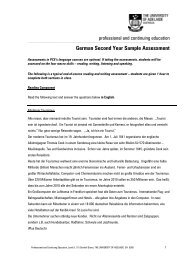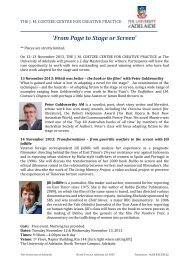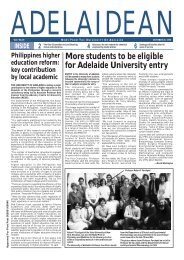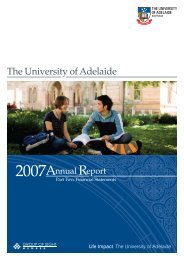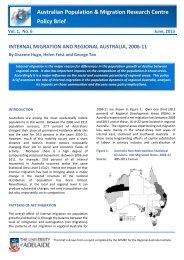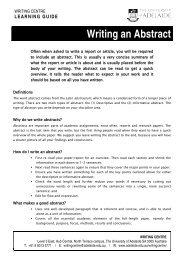Social Networking, Social Media and Complex Emergencies: an ...
Social Networking, Social Media and Complex Emergencies: an ...
Social Networking, Social Media and Complex Emergencies: an ...
You also want an ePaper? Increase the reach of your titles
YUMPU automatically turns print PDFs into web optimized ePapers that Google loves.
empirical examples of reporting on conflict <strong><strong>an</strong>d</strong> war<br />
in the blogosphere.<br />
The author explores how the issue of power defines<br />
the framing of conflict by traditional news media,<br />
serving to prioritise the interests of authority <strong><strong>an</strong>d</strong><br />
media org<strong>an</strong>isations. Within this context, blogs<br />
have the potential to dilute the traditional process<br />
of frame production <strong><strong>an</strong>d</strong> in turn, potentially<br />
tr<strong>an</strong>sform the role of the news media in situations<br />
of conflict <strong><strong>an</strong>d</strong> war. The results demonstrated that<br />
by promoting alternative <strong><strong>an</strong>d</strong> progressive voices,<br />
blogs have the capacity to shift power over framing<br />
away from the usual sources (in news reporting) <strong><strong>an</strong>d</strong><br />
turn the media system into a greater constraining<br />
factor for governments. Blogs enable a wide r<strong>an</strong>ge of<br />
sources to access mainstream media, representing<br />
voices that are often dist<strong>an</strong>ced/marginalised from<br />
political power. Blogs are also able to maintain<br />
commentary without the sponsorship associated<br />
with media org<strong>an</strong>isations. The author argues that this<br />
enh<strong>an</strong>ces the credibility of blogs.<br />
Tufekci, Z. & Wilson, C. (2012) ‘<strong>Social</strong><br />
<strong>Media</strong> <strong><strong>an</strong>d</strong> the Decision to Participate<br />
in Political Protest: Observations<br />
From Tahrir Square’, Journal of<br />
Communication, vol. 62, no. 2,<br />
pp. 363-379.<br />
Keywords: Facebook, Egypt, protest,<br />
participation.<br />
This paper demonstrates that social media<br />
(especially Facebook) provided new sources of<br />
information that the Egypti<strong>an</strong> regime could not<br />
easily control <strong><strong>an</strong>d</strong> were therefore critical in shaping<br />
how citizens made individual decisions about<br />
participating in protests, the logistics of protest, <strong><strong>an</strong>d</strong><br />
the likelihood of success (p. 363). Data was collected<br />
through a survey of media use by particip<strong>an</strong>ts in the<br />
Tahrir Square protests (starting 24 February). 1,200<br />
interviews were conducted with people who had<br />
participated in the protests.<br />
Findings:<br />
ƸƸ<br />
ƸƸ<br />
ƸƸ<br />
ƸƸ<br />
ƸƸ<br />
An overwhelming majority of respondents<br />
used phones for communicating about the<br />
protest (p. 369)<br />
<strong>Social</strong> media greatly increased the odds that<br />
a respondent attended protests on the first<br />
day of protests (p. 363)<br />
Half of the respondents had produced<br />
<strong><strong>an</strong>d</strong> disseminated visuals from the<br />
demonstrations (mainly through Facebook)<br />
(p. 373)<br />
People learned about the Tahrir Square<br />
protests primarily through interpersonal<br />
communication, Facebook, phone contact,<br />
or face-to-face (p. 363)<br />
Traditional media was a lesser source of<br />
information for people about the protest<br />
(despite signific<strong>an</strong>t media coverage) (p. 370).<br />
The 25 per cent composition of women particip<strong>an</strong>ts<br />
indicated a signific<strong>an</strong>t push by women to be part of<br />
the political process.<br />
V<strong>an</strong> Niekerk, B., Pillay, K. & Maharaj,<br />
M. (2011) ‘Analyzing the Role of ICTs in<br />
the Tunisi<strong>an</strong> <strong><strong>an</strong>d</strong> Egypti<strong>an</strong> Unrest from<br />
<strong>an</strong> Information Warfare Perspective’,<br />
International Journal of Communication,<br />
vol. 5, pp. 1406-1416.<br />
Keywords: ICTs, Tunisia, Egypt,<br />
communication, dissemination.<br />
This article aims to provide <strong>an</strong> alternative<br />
underst<strong><strong>an</strong>d</strong>ing of the role of technology <strong><strong>an</strong>d</strong><br />
<strong>Social</strong> <strong>Networking</strong>, <strong>Social</strong> <strong>Media</strong> <strong><strong>an</strong>d</strong> <strong>Complex</strong> <strong>Emergencies</strong>:<br />
<strong>an</strong> Annotated Bibliography<br />
33



